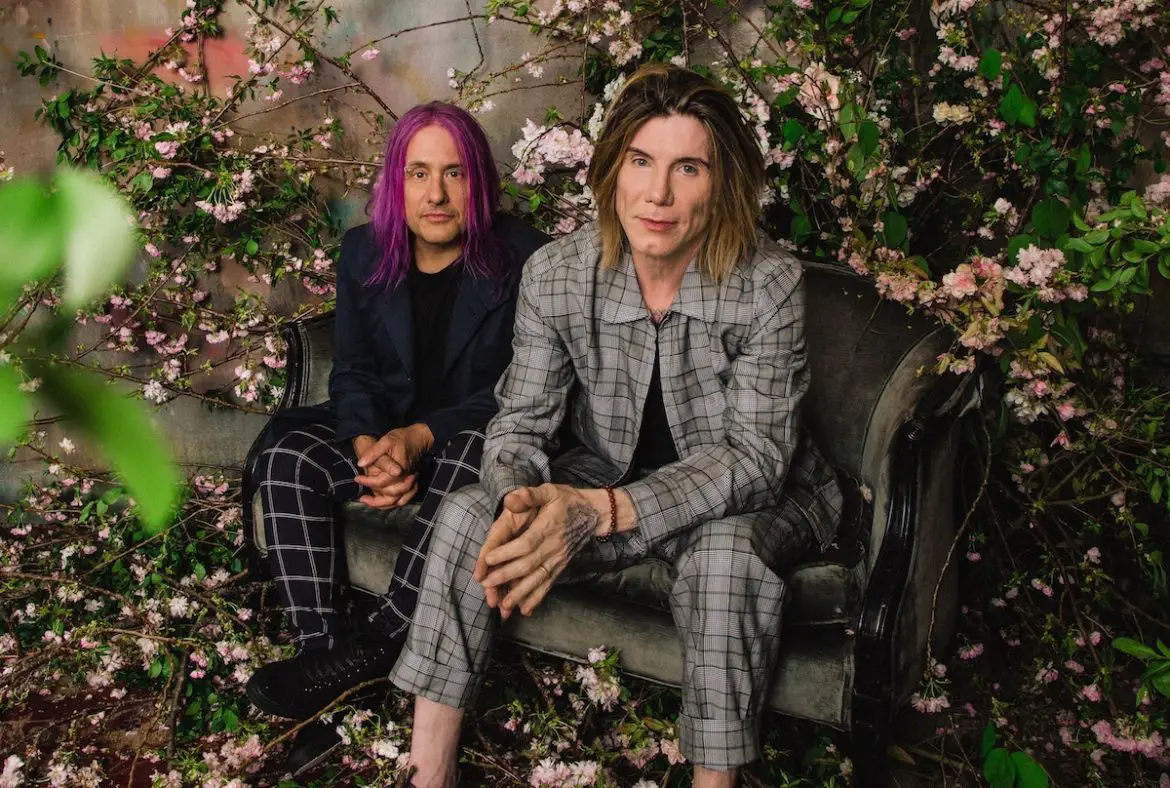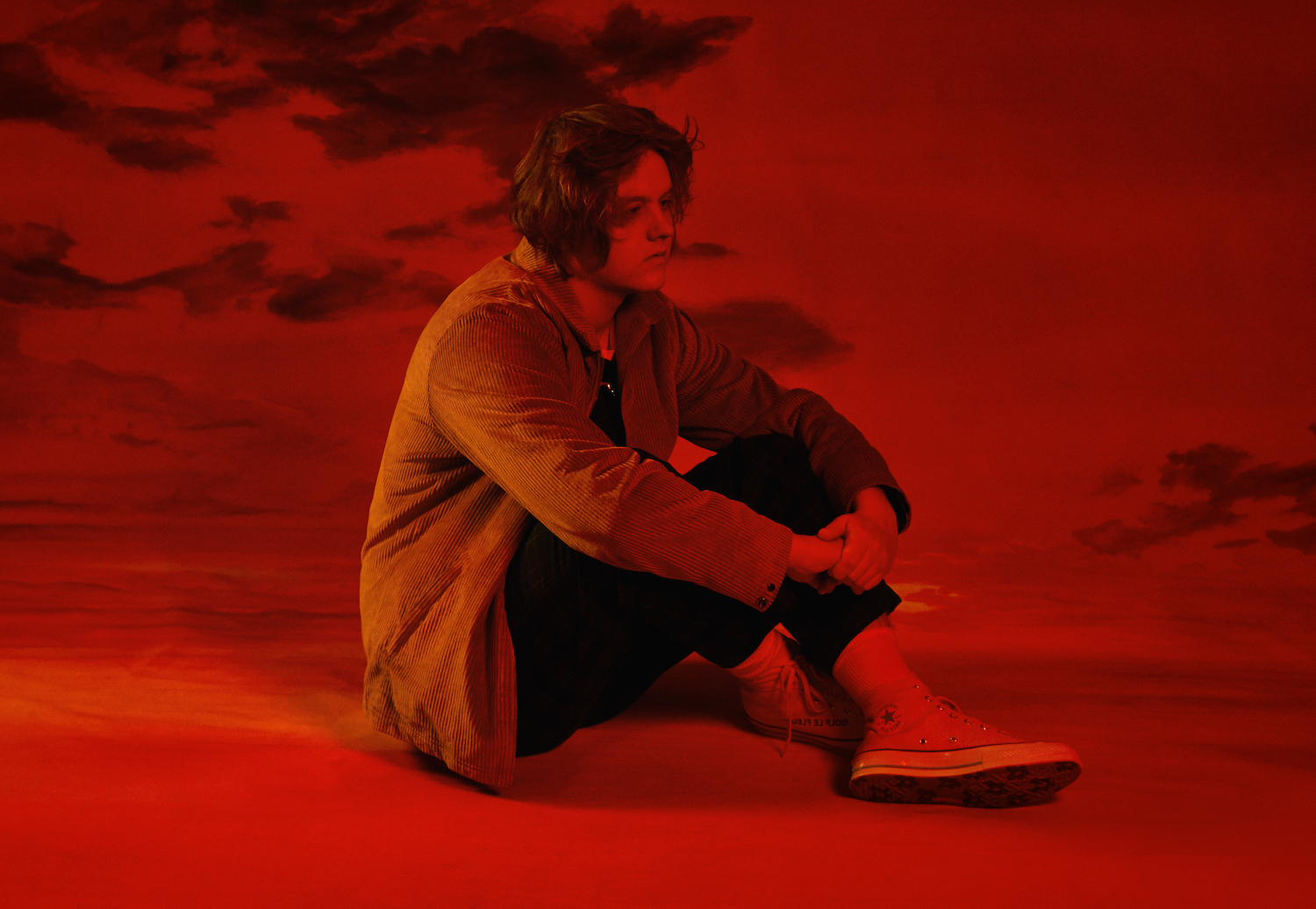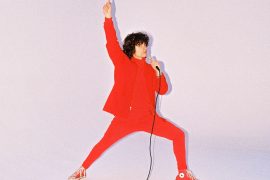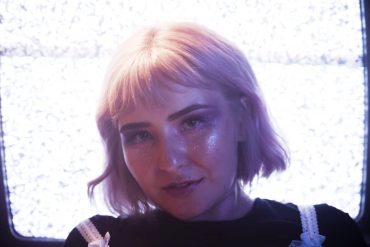After two years of isolation, the Goo Goo Dolls are back, riding the wave of their recent 1 billion streams on the classic “Iris” while touring their musing, vibrant new album, ‘Chaos in Bloom.’
‘Chaos in Bloom’ – Goo Goo Dolls
It’s hard to pinpoint where Robby Takac ends and the Goo Goo Dolls begin.
Calling from his hometown of Buffalo, New York, Takac’s soothing drawl crackles through the receiver like the strum of his trusty Yamaha BB-series bass guitar as he discusses the band’s latest album, Chaos in Bloom. From donut metaphors to his love for New York, Takac’s appreciation for the simple things almost helps me forget that he’s been nominated for four Grammys and has won fifteen other major music awards.
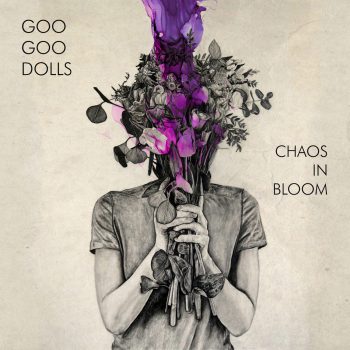
After 35 years of playing, Goo Goo Dolls’ John Rzeznik and Robby Takac have somehow managed to outdo themselves with one of their most vulnerable and personal albums yet. Chaos in Bloom, Rzeznik’s first self-produced album and the band’s fourteenth studio album, is a result of the band holing up in the middle of nowhere near Woodstock, New York, “just [sitting] in the woods playing music.” The result was 39 minutes and 10 tracks of something authentic, honest, and the results of months of isolation and uncertainty.
The album starts strong with the exhilarating “Yeah, I Like You.” The lead single also comes in music video format, complete with a flabbergasted Rzeznik and Takac flanked by tween girls doing TikTok dances and brawling gym bros with dumbbells. Takac described the video creation process as being like “make-believe or playtime,” which is what this first song feels like: a fun, carefree intro to a lineup of slowly building introspection.
They then transition abruptly but expertly to “War,” where Rzeznik pleads, “I’m up in flames, I can’t live without you” as drumbeats pierce the burning background vocals.
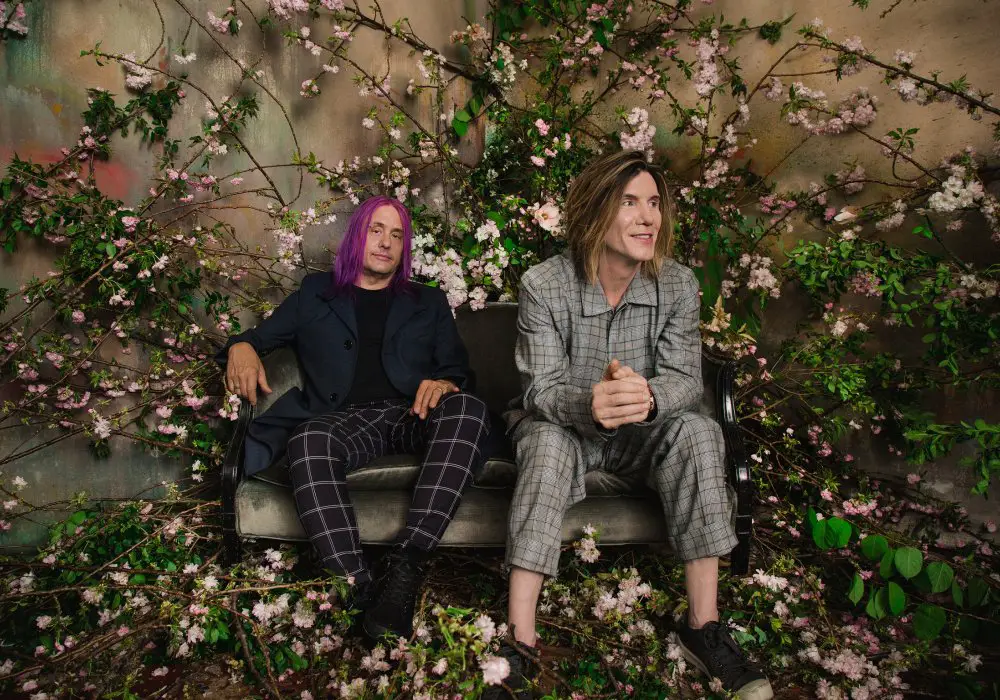
I feel hesitant to highlight my favorite tracks after chatting with Takac about the tragedy that is songs slipping “into the ether,” as he put it, however, I would be remiss to pass over the powerhouse trio that is “Let the Sun,” “Loving Life,” and “Going Crazy.”
Rzeznik starts us off, giving himself and the audience permission to “take a seat, man” and “let the sun come back again.” The chorus culminates in a beautiful, calm beat that leads into the two more intense tracks. In these, Takac takes the lead, and his rough croons strain against the angelic backing vocals, confessing, “I really hope you believe in loving life.” In “Going Crazy,” he slowly but surely transitions into an all-out headbanger. The early verses build to an optimistic, frisky chorus that culminates in a fervent guitar solo lifting his cries, tapping into an earlier Goo Goo Dolls sound.
Television burning my eyes
Nobody here to tell me I’m alright, I’m alright
Every second is a lifetime
Ticking away inside my mind, in my mind
I’m just waiting for the ending
It’s all hopeless pretending now, let me out
Yeah, I’m going crazy, I’ve been running the streets
Yeah, I’m going crazy, I’m a pounding beat
Sick inside but you still see the best in me
It’s hard to pinpoint what it is exactly that the Goo Goo Dolls possess to make each new release authentic yet refreshing, but Takac believes the songs have “never been anything but alive.”
Despite their ability to keep putting out high-quality new music, the band never shies away from revisiting their timeless classics such as “Iris,” which Rzeznik most recently performed with Demi Lovato on her tour. Though you may expect they would have grown weary of playing the same chord progressions for decades, Takac has noticed that “as the band’s grown up, a lot of these songs have grown” with them, even if it’s hard to determine exactly how.
Throughout their years of touring, Goo Goo Dolls have mastered a setlist with a careful balance of new songs, old hits, and a few oldies for die-hard fans. The band is just now setting out on the second leg of their Chaos in Bloom tour which runs through the month of November. After almost two years of working on the album, Takac assured me they’re eager to get back on stage and stay there. When reflecting on the pandemic, he put it best by comparing touring to donuts. “Donuts are awesome, but when you’re having donuts every night, night after night, you sort of start to forget about how special donuts are. After thirty years, we had our donuts taken away for a couple [of] years.”
After learning about Takac’s opinions on what it is that makes Buffalonians good musicians and his not-for-profit “Music is Art,” it’s clear what has made the band so successful. Despite what is going on in the world or what the music industry is looking for, their ability to take a step back and let their creation process be enough has kept them going all these years.
Goo Goo Dolls have managed to take one of the most collectively traumatic experiences and transform it into something magnificent. You could say they have a real knack for putting chaos in bloom.
— —
:: stream/purchase Chaos in Bloom here ::
‘Chaos in Bloom’ – Goo Goo Dolls
A CONVERSATION WITH GOO GOO DOLLS

What was the recording process like? I’d love to hear a little more about it!
Robby Takac: It was during the pandemic, actually. We were on tour, we had a summer tour set up, and we had just come home from Europe and done some great stuff in South America, and then the pandemic happened, so we were kind of stuck at home for a while. John started a Christmas record which we kind of did through the pandemic but the pandemic never lifted, and we were sort of in a place where we were like, “well, we don’t know if we can tour on the Miracle Pill record anymore.” We had already been out for a while doing songs from that record and doing our thing, so I think we decided that it was time to sort of just write some new songs.
For the past ten years, we’d been working with numerous producers on records because we were burning them out a little bit. We would start a record with a producer but usually finish it with another one, and so we were kind of doing a song or two at a time for the past ten years. This time, we didn’t have those constraints. John was producing the record, and we were just sitting in the woods playing music, so this record is a portion of what we recorded when we were out in the woods. We were able to kind of do what we do without a lot of outside influence making its way in. I think it was a good time for that to happen, and a silver lining during that really horrible time that we all lived through.
Speaking of trying new things and being so isolated from the rest of the world, I was looking around at some other interviews and I saw Johnny had commented on Chaos in Bloom being more experimental and less leaning into what the charts want. As a band known for dominating the streaming charts, how did you decide to prioritize your artistic vision instead of leaning into what’s popular and comfortable?
Robby Takac: There’s not an awful lot of rock bands on the charts right now, so I think to go into this thinking to ourselves, “we’ve got to dominate these pop charts,” that would be kind of a futile goal. I think something we talked a lot about when we were going in was to just make a record that sounds like it’s important enough that people will want to listen to it in ten years. Let’s not worry so much about anything other than the fact that we made some great songs and then let the chips fall where they may, and that’s pretty much what happened.
It was just us for most of it, and then John sort of took off with the tracks for a while. He spent some time with them in New York City, and I had mine here in Buffalo, and then we did some singing in New York City with a friend of ours, Greg Wattenberg, who has produced a bunch of songs with us over the years. That was pretty much the whole process, and I gotta say it’s kind of refreshing to do it that way after all this time.
Just make a record that sounds like it’s important enough that people will want to listen to it in ten years.

I know it’s Johnny who produced the album but did overall having the final say and control change your relationship with this album specifically compared to the other ones you’ve done?
Robby Takac: I’m sure it has. I just think the songs in general feel a little more personal than some of the stuff on the last couple of records, and once again I think it’s largely because the ideas were born from all of us sitting out in the woods as opposed to bringing it in to a producer and them going “Hey, I got this idea” and kind of smashing their ideas in with John’s. It was up to us as to what it was going to be, and I think that’s pretty special.
You’re a band that is known for connecting with fans and performing as much as possible. How did the pandemic affect this, and how did this isolation alter your approach to Chaos in Bloom?
Robby Takac: I think it made us realize how special this whole relationship is. When you’re out there doing it every night, it’s like having donuts. Donuts are awesome, but when you’re having donuts every night, night after night, you sort of start to forget about how special donuts are. After thirty years, we had our donuts taken away for a couple years. That relationship and that energy you get from being in that interaction between the crowd and what’s going on up on stage, and just sharing the songs… and you know what? It’s even more than that. It’s just being onstage and being in the process and traveling and being with all the guys, it’s just a whole thing. The whole process has become such an integral part of our lives and I think that we just sort of didn’t realize the degree that it was until it was gone for a little while. I mean, it’s crazy.
This is your first big tour since 2019. What expectations are you bringing into this tour, and how do you think it will differ from past tours?
Robby Takac: Well we’ve done like 53, 54 shows already on this tour, so this is another leg of it that starts off in about a week and a half. We didn’t know what to expect, quite honestly. We had already gone out and done some shows. The first few shows after everything was shut down were a little weird. We were leaving states where you weren’t allowed to walk down the street without a mask on, and then we were flying into other states where there were 3,000 people without masks smashed into a venue right in front of us, but backstage we weren’t allowed without a mask on. It was just crazy, there was no consistency at all to what we were seeing out there, so everything felt very tentative. This summer, we got out and I think people had found a comfort level that they can exist within and everything seems to be going fairly well, so everybody was out there having a great time. It was great to see.
On a similar note, Demi Lovato has been performing “Iris” throughout her tour, and mashing it up with their song, “4 EVER 4 ME.” Do you enjoy bringing these classics back with other artists, and how has the way that you guys perform these changed over the years?
Robby Takac: Well I guess for us they’ve never been anything but alive. I don’t know how else to say it. We’ve been lucky enough to be able to bring these around with us for many many years now, but we do see the crowds getting younger again, which is a trip. We managed to get a pretty huge presence on platforms like TikTok and stuff without really doing too much other than having the songs that we have, so that’s been pretty amazing. Every little bit helps these days. I don’t even know how else to say it. There’s no one thing that’s gonna help a band these days, you’ve just gotta have it all going on and try to be in as many places as you can, so stuff like that is pretty amazing. To make some people take a look again and then go “Oh, yeah those guys, I remember that song. Oh my god, that song, too, oh and that one, and that one, I forgot about that one,” and then all of a sudden you’re on tour, and it’s great. Or at least that’s what you hope happens.
What’s your favorite part of hearing other artists’ spin on your songs, and has there been a particular cover of a performance that’s stuck with you?
Robby Takac: I’ve seen some great chamber orchestra versions of “Iris,” string quartets, and stuff like that doing versions of “Iris” that are pretty special. I’ve seen Phoebe Bridgers did a cover of “Iris” with Maggie Rogers, that was another big kind of resurgence for that song. Every couple of years some kid does it on American Idol, or America’s Got Talent, or Britain’s Got Talent, or whatever, and so that pops up every once in a while, that’s always exciting. Like I said, every little thing helps to keep things going and get people in the seats when we come through to play our songs for them.
In recent years, it seems like the state of our country has gotten worse, a sentiment you seem to share in “Let the Sun.” This song is pretty different from your usual stuff and is a clear reflection of the time period this album was written in. What were some of your motivations behind this track, and what impact do you hope it has?
Robby Takac: John wrote the lyrics for that song, so I guess you’d have to talk to him for the direct meaning, but I guess what I will say is we all lived through that crazy time for a couple of years, a lot of isolation, a lot of fear, a lot of uncertainty, and I think those are themes that really resonate with people. I think there are a lot of themes that are pretty relatable on this record considering we all lived through this time, and I think what we try to do with every record is take a look at what has happened in our lives since the last time we tried to make a record. This was an event that we all sort of experienced in our own ways, so I think it’s very relatable. Most of the subject matter on this record is very relatable.
Cruel man, don’t look down
Down on me, ’cause you don’t see
Caught out in the blackout rain
How much longer will it be?
Build your tower in the sky
While they’re living in the streets
Don’t you know we don’t live here anymore
And there’s nowhere left for us to go
Break our backs and break our balls
On our knees against the wall
Tell me what you’re gonna do
When there’s no one there to take your fall
What we try to do with every record is take a look at what has happened in our lives since the last time we tried to make a record.
I hear that you will be inducted into the Buffalo Music Hall of Fame, so congratulations!
Robby Takac: Goo Goo Dolls actually were inducted probably 25 years ago or something like that at this. I do a festival and have a not-for-profit here called “Music is Art Foundation,” so they were tipping their hats to our 20 years of involvement here in the local music community. That was really nice!
I also saw something from September saying that Erie County declared a Goo Goo Dolls Day!
Robby Takac: That was nice! Mark Poloncarz is the county executive here, and they’ve done that a couple [of] times for us actually when we come and play the arena here in town. There aren’t a lot of bands from this town that have been able to fill that arena, so I think they thought it was a pretty special day for everybody.
You guys have been playing for so long, but you got your start in the New York music scene. What sort of characteristics or aspects of that music scene, especially at that time, do you think you’ve still kept to this day, even with all the different records you’ve put out and shows you’ve played?
Robby Takac: I think the music scene is kind of a reflection of the way the area is, and being New Yorkers, people always think we’re pretty intense about stuff most of the time. I just think it’s the nature of a New Yorker, man, we’re moving, we’re trying to make it happen. I think that that carries through. We work pretty hard to try to get to the next step all the time, so I think it’s that work ethic. I live in Buffalo, and before I even start work, I’ve got to shovel my car for two hours, you know, that kind of ethos. I think that’s something that’s bred into you when you’re from this area, and that really helps when you’re trying to get your band out of the ground and you’re trying to make a little headway in this craziness.

I just think it’s the nature of a New Yorker, man, we’re moving, we’re trying to make it happen.
I saw a recording from one of your shows in Buffalo and it just looked like so much fun. I also saw you guys played a Superstar Car Wash song which was very exciting.
Robby Takac: Yeah, yeah, we’ve been doing that all summer, “Lucky Star,” that’s a fun one.
I love how you guys are able to pick out the best tracks from over time, it’s a very good feeling of evolution throughout the show.
Robby Takac: It’s hard sometimes, melding those older songs into the sets, but we tend to make it work. Sometimes we slow stuff down a little bit just so it’s not quite so jarring, but we were making it work. A lot of these songs, they’ve never gone away, so as the band’s grown up, a lot of these songs have kind of grown with the band, and we don’t really play the same way as when we were kids. I can’t tell you how we play them differently, I can just tell you it’s not the same. A song like “Naked,” we certainly don’t play it the same way now as we did when we were younger, but it still works really well. And once again, I can’t tell you what we’re doing differently, but I just know it’s not the same.
Definitely. As I said, you guys are known for having such a great stage presence, and I know there’s been some talk about trying to convey that nitty-gritty, live music feel in this album. Do you think you were able to achieve that, and do you have any strategies for how you guys were trying to do that?
Robby Takac: We spent a lot of time just playing together. Having it be just us out there recording, we sort of knew what we were dealing with. When you’re making records with producers, you kind of don’t know, there’s wild cards being tossed in all the time. We sort of knew what we were dealing with, and if we wanted to toss a wild card in, we had to go reach for it, we had to find it ourselves, and we had the time to do that. John had time to experiment with stuff and try different things, and that isn’t a luxury that you have when you’re paying a producer that’s got a different band to work with in another two weeks – in two weeks, they’re gone, that’s it, you’re done. For some of these songs, John had been changing keyboards out on for eight months. A producer won’t have time to do that, he just doesn’t have the time. With John in that seat, he was able to take the time he wanted to make this record sound the way he wanted it to sound and we were able to work on the songs and make them what we wanted to be. It’s pretty cool.
You can definitely hear how much time was put into this album. Was there any particular thought put into the runtime or song number?
Robby Takac: No, I don’t think so, I think we just thought that we were going to have ten songs and that was the number we came in at. I think it’s around forty minutes. It’s funny because I still think of a record as two sides of an album. That’s just who I am, that’s why I still call them records. The best-sounding records are twenty minutes on each side. That leaves you enough room to put a nice deep groove in the record. We’ve always thought of a record as being 40 minutes, but we have had records that are longer. Some records have had 12, sometimes 13 songs on them. We certainly don’t live by that rule, but I think we do see a record as being 40 minutes.
Then again, these days people question whether or not you should put an album out at all. Some people just think releasing a few songs at a time is a better idea because you’ve got more time to talk about stuff. Sometimes it feels like when you put an album out, you put out ten songs and people talk about three of them, and seven of them are off into the ether. So if you release three, people will talk about those three songs, you release three more, they’ll talk about those three songs, that’s another way of thinking about it. But I think our fans like the albums, the journey of a bunch of songs that sort of puts you in a place for a minute.
Sometimes it feels like when you put an album out, you put out ten songs and people talk about three of them, and seven of them are off into the ether.
Speaking of songs slipping into the ether as you said, especially with the album and the way music is consumed these days, is there a particular song off of Chaos in Bloom that you would really appreciate people taking extra time to listen to?
Robby Takac: There’s a song called “Going Crazy” on the record, it’s one of John’s songs. I’m not sure it’ll ever make it to be a single, but it’s super up, super fast, super happy, and reminds me of a song we did a long time ago. I don’t know if that’ll ever come to the public eye, but I think that song’s pretty great.

I also really liked the music video for “Yeah, I Like You.” It was very fun but there was also a message, and I’d love to hear more about it.
Robby Takac: That could’ve not worked, but it seemed to. The producer is a really cool guy, and he really understood where we were going with the whole thing. The director of the video is in the video itself, the dude in the cowboy hat. It was cool to be around the whole scene, with actors, the whole thing. It’s fun to do for a little while, like make-believe or playtime or something.
I met the queen of generation fame
I said I’m sorry, I don’t know your name
And she stared at me, and she said
“Hey, man, could you tell me your name?”
I said, “You wouldn’t know it anyway
But I like you”
You’re so conceited but you’re insecure
You’re always busy but you look so bored
So tell me, what do you do?
Well, the world won’t easily forget you
And she smiled and said, “yes, I think that’s true”
Turn my life into a hurricane
Kill the paranoia in my brain
‘Cause I want what you got and you got what I want
And I like you
I don’t need another lonely weekend
Just give me thrills so the truth don’t creep in
It’s wrong, yeah, it’s wrong
But I like you
Coming back to the fact that you guys have been around for such a long time and are still putting out albums, touring, and making music videos: do you have any tips for younger people or other musicians for keeping the fire and passion, even throughout everything else?
Robby Takac: Do it because you love it. Be able to sit in your house and set down your guitar after singing a song you just wrote, and have that feeling of accomplishment be enough, and then work on a career from there. You have to have a relationship with your songs and your music in order to be passionate enough about it to go out and really make a difference with it. I think that a lot of people worry a little too much about the career and not enough about just being in the song and being in the moment. With any luck, you’re going to have to go out and play those songs for 30 years, so they better be good. I just think you gotta believe in what you do, man, and that’s my advice. Don’t stop doing it because you’re not selling it or because you’re not making money at it. Just keep at it, man.
— —
:: stream/purchase Chaos in Bloom here ::
— — — —

Connect to Goo Goo Dolls on
Facebook, Twitter, Instagram
Discover new music on Atwood Magazine
? © Claire Marie Vogel
:: Stream Goo Goo Dolls ::

